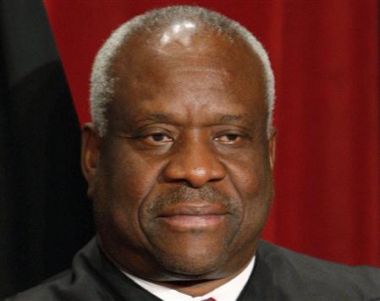Justice Clarence Thomas: Supreme Court decision 'distorts principles on which this nation was founded'

Along with the US Supreme Court's decision legalising same-sex marriage in the US, Justice Clarence Thomas issued his dissenting opinion, declaring that the ruling "distorts the principles on which this nation was founded" and "threatens the religious liberty our nation has long sought to protect."
Thomas' contrary view echoed the disappointment expressed by conservatives and religious organisations following the Supreme Court's 5-4 vote legalising same-sex union throughout the US.
Thomas said numerous friends of the court have cautioned the Supreme Court that its decision will "have unavoidable and wide-ranging implications for religious liberty."
The General Conference of Seventh-Day Adventists, Thomas said, declared that "in our society, marriage is not simply a governmental institution; it is a religious institution as well."
"Today's decision might change the former, but it cannot change the latter. It appears all but inevitable that the two will come into conflict, particularly as individuals and churches are confronted with demands to participate in and endorse civil marriages between same-sex couples," Thomas wrote.
He said religious liberty "is about freedom of action in matters of religion generally, and the scope of that liberty is directly correlated to the civil restraints placed upon religious practice."
If the majority of the Supreme Court, he said, had allowed the definition of marriage to be left to the political process, as the Constitution requires, the public "could have considered the religious liberty implications of deviating from the traditional definition as part of their deliberative process."
He lamented that "instead, the majority's decision short-circuits that process, with potentially ruinous consequences for religious liberty."
Thomas wrote that human dignity has been understood in the US to be "innate" and cannot be taken away by the government.
"Slaves did not lose their dignity (any more than they lost their humanity) because the government allowed them to be enslaved. Those held in internment camps did not lose their dignity because the government confined them. And those denied governmental benefits certainly do not lose their dignity because the government denies them those benefits. The government cannot bestow dignity, and it cannot take it away," he said.
He said the US Constitution "was predicated on a simple truth: One's liberty, not to mention one's dignity, was something to be shielded from—not provided by—the State."
Thomas lamented that "today's decision casts that truth aside."
"In its haste to reach a desired result, the majority misapplies a clause focused on 'due process' to afford substantive rights, disregards the most plausible understanding of the 'liberty' protected by that clause, and distorts the principles on which this nation was founded. Its decision will have inestimable consequences for our Constitution and our society."











